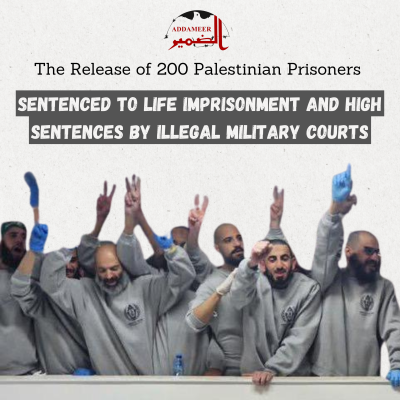
On Saturday, January 25, 2025, 200 Palestinian prisoners were released as part of the second batch of the first phase of the exchange deal. According to the agreement and the announcement, 107 prisoners sentenced to life imprisonment and high sentences were released to the West Bank and occupied Jerusalem, 20 prisoners were released to the Gaza Strip, 71 prisoners sentenced to life imprisonment were forcibly exiled abroad to Egypt as a first phase, and two prisoners were released from within the territories occupied in 1948.
It is worth noting that most of those released were arrested during the Second Intifada, and the Occupation’s military courts issued arbitrary sentences against them. Over the years of occupation, its authorities have consistently violated guarantees of fair trial, especially concerning pretrial procedures. Military orders allow the occupation authorities to prevent detainees from meeting their lawyers and receiving legal counsel, particularly during the interrogation stage. This ban on meeting lawyers can last for months, hindering the preparation of a legal defense and serving to conceal the crimes of the occupation, such as torture and ill-treatment inflicted on detainees during interrogation.
Moreover, the occupation authorities practice various forms of physical and psychological torture against Palestinian detainees in interrogation centers run by the Israeli intelligence agency. These acts of torture often lead to confessions being extracted under duress, pressure, and coercion. Such illegally obtained confessions are later used as evidence against detainees during trials, forming the basis for convictions and imposing sentences that may reach life imprisonment.
In light of all the unlawful practices imposed on Palestinian detainees during pretrial procedures, they are subsequently tried before arbitrary and illegitimate military courts. These courts have prosecuted hundreds of thousands of Palestinians under illegal military orders that have affected all aspects of Palestinian life, targeting individuals for exercising their basic right to self-determination.
The violation of fair trial guarantees, including the failure to inform detainees of the nature and reason for their charges, the lack of independence and impartiality of these courts, the absence of public trials which prevents public oversight, the lack of effective and immediate translation, and the denial of the detainees' right to effective defense by not providing the necessary facilities to prepare their defense, all serve as the basis for classifying these practices as war crimes. These violations necessitate accountability and the prosecution of the occupying state for its actions.
In light of the release of a number of Palestinians sentenced to life imprisonment and high sentences, Addameer expresses its concern about the potential re-arrest of released prisoners under the pretext of violating the conditions of their release. This concern arises due to the presence of Article (186) of Military Order No. (1651) of 2009, which allows for the re-arrest of freed prisoners released in exchange deals to serve the remainder of their sentences based on a secret file.
Without exerting pressure on the occupation authorities to revoke this article, it will remain easy for the authorities to re-arrest any of the released individuals without presenting any evidence against them and without subjecting them to legal procedures.
Addameer emphasizes the necessity of pursuing and holding accountable all those involved in the crimes committed against Palestinian prisoners who have spent years of their lives behind bars, subjected to arbitrary and unlawful trials, and exposed to various forms of torture and ill-treatment. It also stresses the importance of providing reparations to Palestinian prisoners and addressing the harm caused to them due to their imprisonment and prosecution for exercising their right to self-determination.
This position aligns with the advisory opinion of the International Court of Justice, which affirmed that the illegal occupying state bears the obligation to provide full reparations to Palestinians for the damages resulting from its internationally unlawful acts. This applies to all natural and legal persons concerned and includes providing reparations to Palestinian prisoners who were tried under illegal military orders and subjected to illegitimate military courts that lack the minimum requirements for fair trial guarantees.